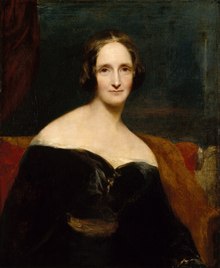
Creator of the novel Frankenstein (when she was but in her early twenties), Mary Shelley led a highly fascinating and somewhat tragic life. Her father was the anarchist author William Godwin, her mother Mary Wollstonecraft, author of A Vindication of the Rights of Women (and who died shortly after giving birth to Mary). She was also married to the outspokenly atheistic poet Percy Shelley until he tragically died in the Bay of Spiza in Italy in 1822.
Although most people believe Mary Shelley wrote Frankenstein to critique the Industrial Revolution's focus on the life of the mind while overlooking the supremely important place of the heart, and she did, there might be more to the story. More precisely, Frankenstein is a parable about the limits of humanness. In the person of the "monster" (who turns out to be far more intelligent than the 1931 Hollywood movie makes him out to be), Shelley provides an incisive narration of the ultimate emptiness of the human condition. She powerfully demonstrates that for all of its magnificence, humanity is finally as confused and shallow as the world over which it purports to rule.
Dr. Frankenstein's words, in the movie, upon seeing the "monster" move its hands, exclaims, "Now I know what it feels to be God!" speaks volumes about Shelley's vision. What would we do, really, if we were God? Would we create the world as it is, or would we do something entirely different? And how would we know either way?
Can any of us bear the burden?
By the way, I'll be backpacking in the American West into next week. Thanks for reading. Catch you upon my return.
No comments:
Post a Comment